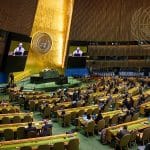Toyota and Nissan, two major Japanese automakers with substantial manufacturing capacity, pulled out of Russia after both claimed that carrying out any future business under Vladimir Putin’s dictatorship is impossible.
The two companies also convinced their senior management that production suspensions caused by Western sanctions have caused mounting shortages of key components and materials. Toyota announced in early autumn that it would be closing its plant in St. Petersburg, and was considering selling it.
Production at the plant, which produced Toyota’s Camry and RAV-4 models. has been suspended since March. While Toyota has opted to end its Russia-based production of vehicles, it has stated that it will keep a vastly downsized organization in Russia to provide service and parts to existing Toyota and Lexus customers.
Nissan followed Toyota’s announcement that it is also pulling out of Russia. It will sell all of its shares to a locally registered joint venture firm linked to Nissan Manufacturing Russia LLC that runs the St. Petersburg plant to a state-owned entity for one euro. The transaction includes provisions that allows Nissan to re-assume ownership if the situation changes in the coming years.
The plant employed about 2,000 workers and produced 45,000 SUVs annually until operations were halted in March after Russia invaded Ukraine. The pull out will generate a loss of ¥100 billion or about $686 million for Nissan.
This transaction echoes a move by Nissan’s top shareholder, French automaker Renault, which sold its majority stake in Russian carmaker Avtovaz to a Russian investor in May.
Japanese auto manufacturer Mazda is reportedly also in talks with its local joint venture partner to end production at its factory in Vladivostok, as is Mitsubishi Motors.
The normal practice in these closure cases is to manage them as share transfers among commercial entities instead of portraying them as what they are in most cases, nationalization. Some of the Western plants idled by sanctions have allegedly been kept in the private sector, through share sales to Russian oligarchs cooperating closely with Putin.
The net impact of these withdrawals will not be seen in immediate unemployment for the factory workers, but in a medium- to- long-term hollowing out of many Russian industrial units/capabilities dependent on Western technology and inputs.
That is, of course, the intent of theWestern sanctions program, which is working to steadily raise the long-term cost to Moscow for its invasion of Ukraine.
Although denied by Kremlin state propaganda, the lesson will not be lost on Russia’s leaders.







